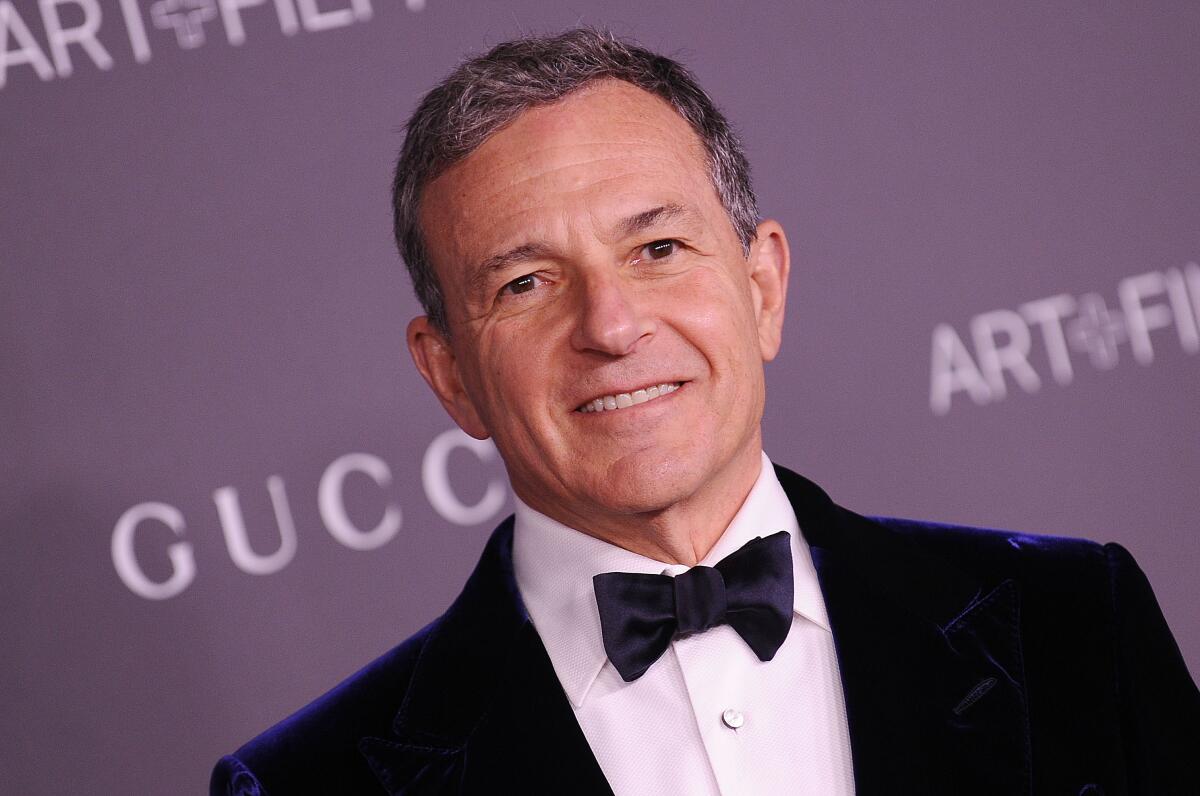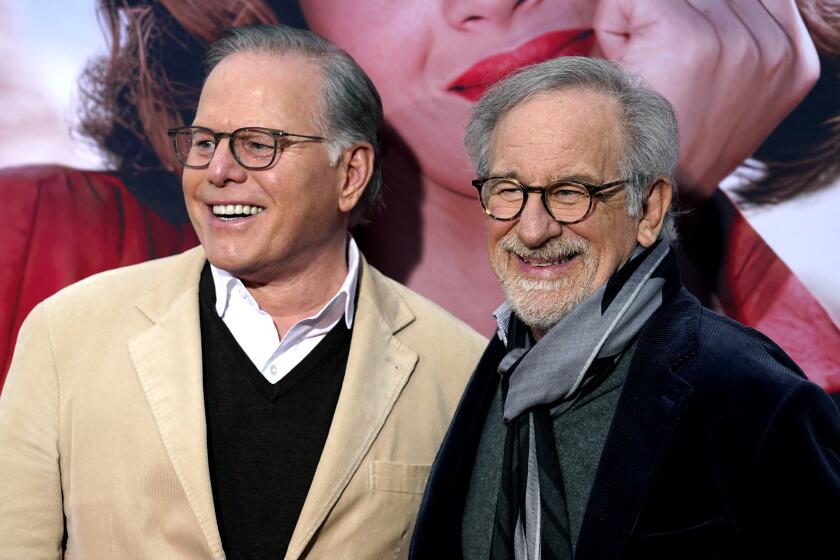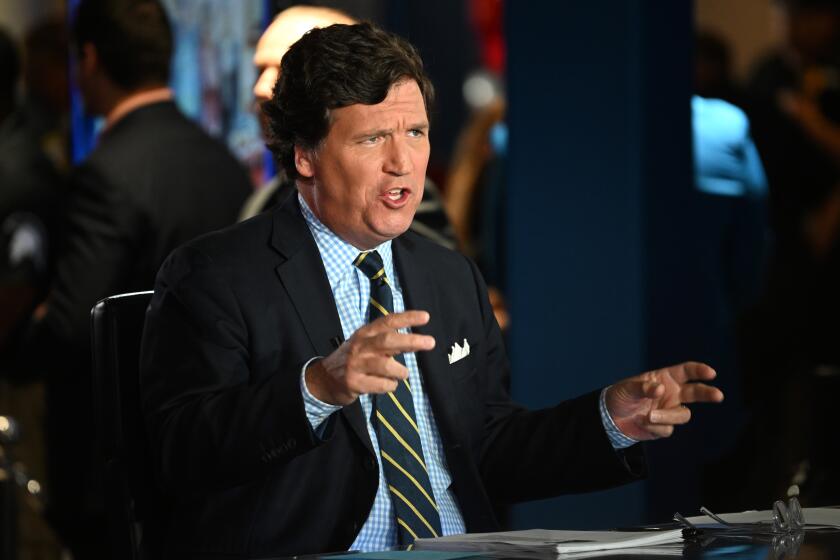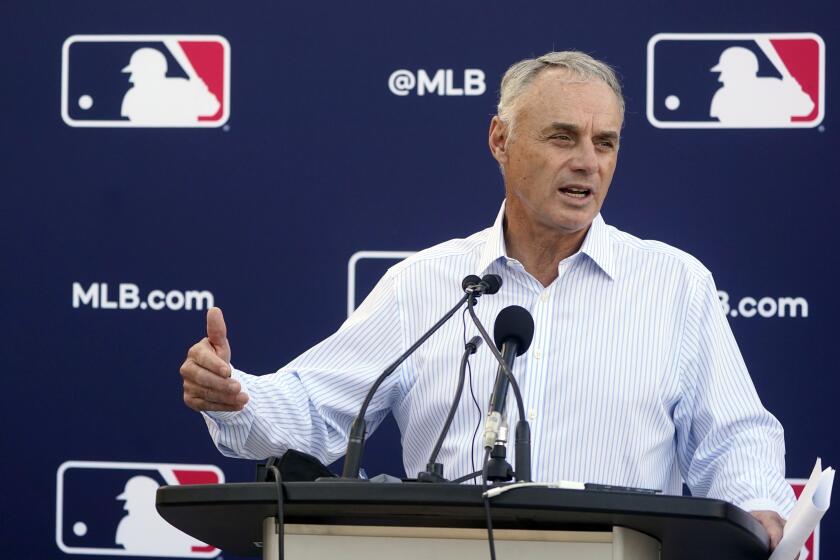Column: A plague on both Disney and Spectrum for treating their customers like crap

- Share via
Someone — either Walt Disney Co. or Charter Communications, the owner of Spectrum — owes me $38.05.
That’s what I spent the other day for an indoor antenna to allow me to watch ABC-TV Channel 7, one of the 20 channels that Disney pulled off Spectrum last week in the two behemoths’ dispute over how many billions of dollars will flow between them for the privilege of pumping entertainment and sports content into our homes.
For the record:
2:04 p.m. Sept. 6, 2023An earlier version of this column incorrectly stated that Disney paid dividends in 2020 through 2022. Disney has not paid a dividend since the second half of fiscal 2019.
If you’re unfamiliar with the process, think of it this way: Every dime they’re fighting over comes out of our pockets, either directly through subscription payments, or indirectly via the cost of commercials that the companies selling us everything from cars to Kleenex pass on to us in their pricing.
Disney wants to limit our ability to provide greater customer choice in programming packages, forcing you to take and pay for channels you may not want.
— Spectrum statement on Disney fight
Cable subscribers would be justified in thinking, “Not this again.”
As my colleague Meg James has reported, blackouts resulting from so-called carriage disputes have become vastly more common in recent years, as content providers battle with cable operators and satellite services over how much either side is willing to pay, or receive, for the right to transmit content to subscribers.
Customers of satellite provider DirecTV have been without Nexstar TV stations, including KTLA Channel 5 in Los Angeles, since July.
Get the latest from Michael Hiltzik
Commentary on economics and more from a Pulitzer Prize winner.
You may occasionally receive promotional content from the Los Angeles Times.
The underlying problem, of course, is that cable service almost everywhere in the U.S. is a monopoly. Spectrum’s roughly 15 million subscribers, including the roughly 5 million in Southern California who make Spectrum the largest pay-TV provider in the region, don’t have anywhere else to go for cable service. (Though they can go satellite via Dish Network or DirecTV.)
If one could switch from Spectrum to, say, Comcast with the press of a button or a phone call, how long do you think the Disney-Spectrum standoff would last?
In this new dispute, both Disney and Spectrum are pretending that they’re only out to protect us, the consumers. They’re both real apologetic that we’re caught in the middle.
According to the splash screen on Spectrum that has replaced the content one might prefer to find on the ABC network, ESPN, FX or the other Disney channels, “Disney wants to limit our ability to provide greater customer choice in programming packages, forcing you to take and pay for channels you may not want.”
Turner Classic Movies is not just a channel; it’s a shared cultural legacy. But TCM’s new owner decimated its top staff, prompting cinephiles and historians to lament its passing.
Disney, in its version, says its channels “are blacked out due to a dispute between Spectrum’s parent company — Charter Communications — and Disney Entertainment.... Disney deeply values its relationship with its viewers and is hopeful Charter is ready to have more conversations that will restore access to its content to Spectrum customers as quickly as possible.”
Do you buy either of these statements? Me neither.
A couple of relevant points:
Spectrum’s claim that it’s all about offering “greater customer choice” must be some sort of a gag. Even if that’s true today, its parent, Charter, like every other cable company in the nation, fought for decades against the very concept of “unbundling” cable channels.
Their fundamental business model was to offer programming packages bristling with channels that you didn’t care to watch, just so you’d sign up for access to the few you wanted to watch. It wasn’t that long ago that the claim was that offering stripped-down packages that allowed consumers to pick and choose would cost them more. (This turned out to be true, but for the wrong reason, as anyone who totes up the bills for their streaming services will discover.)
As for consumer choice today, have you tried to drop Fox News from your Spectrum system lately? Good luck: No matter how repulsed you might be by Fox’s mainstreaming of racism and Donald Trump’s election lies, you’re paying for it.
Disney deeply values its relationship with its viewers and is hopeful Charter is ready to have more conversations that will restore access to its content to Spectrum customers as quickly as possible.
— Disney statement on Spectrum fight
Disney’s statement is so artful it’s almost adorable. Notice the passive voice in its assertions that its channels “are blacked out due to a dispute” and that it hopes that further conversations with Charter “will restore access to its content.”
Reading that, you might not realize that the Disney channels are blacked out because Disney pulled them off the Spectrum system, unilaterally, last Thursday afternoon. Disney did it, not Spectrum or the man on the moon.
Spectrum further states, by the way, that “the rising cost of programming is the single greatest factor in high cable TV prices.”
Fox News has been losing advertisers, but because it makes a profit from cable carriage fees, even viewers who hate it must pay for it.
Is that so? According to its annual reports, Charter’s profits rose to $5.1 billion on revenue of $54 billion last year, from $3.2 billion on revenue of $48.1 billion in 2020. In other words, its profits rose by 56.8% while revenue rose by only 12.3%. It also spent $7.2 billion to repurchase its shares from Liberty Media in 2022 and 2021. Maybe profits and share buybacks played a teensy little role in its cable TV prices.
Disney, which has been pleading poverty lately, also has done pretty well. It recorded a profit of $3.6 billion last year on revenue of $74.2 billion, up from a profit of $2.5 billion on revenue of $61.8 billion in 2021. (The company booked a $2.5-billion loss in 2020, when its theme parks were closed by the pandemic, so leave that aside.)
What the Disney-Spectrum dispute is all about is Spectrum’s desire to offer its cable subscribers ad-supported versions of Disney’s ad-free streaming services (for which Disney charges a stand-alone monthly fee) as part of their cable packages, thus claiming some of the audience that has cut the cable cord to go full-streaming. Disney has refused. And there you are.
Charter Chief Executive Christopher Winfrey has threatened to “move on” from providing TV service at all, or perhaps permanently doing without Disney’s channels entirely. Of course, that would hasten the flight of customers from his television business, so place your bets now on whether that will happen.
Winfrey told Wall Street last week, after Disney’s blackout, that “the video ecosystem is broken.” That was nervy of him, since companies like his rode a majestically profitable wave for years before playing their own role in breaking it.
Who will stand up for the poor plutocrats who own Major League Baseball?
The customers of these companies have reason to curse them both. My bill for Spectrum comes to about $320 a month, for which I’ve had the right to expect that it would provide me with the TV, internet and telephone services without interruption. Its inability to strike a deal with Disney is nothing short of a betrayal of its promise.
As for Disney, it is breaking its implicit promise to us customers that it will provide the content that it has placed its name on, without interruption. (This is why when I first wrote about its conflict with Florida Gov. Ron DeSantis, I called both parties “detestable in their own way”; I stand by that judgment today.)
Can anything break this logjam? Our government regulators gave up their leverage long ago, when they waved through the various mergers that turned Charter into a nationwide cable behemoth and allowed Disney to acquire the ABC network in 1996 and Pixar, Marvel and 21st Century Fox subsequently.
Those deals on both sides raised the stakes for consumers when events like the current dispute erupted. It was always clear that none of the acquisitions was about a better deal for consumers — in fact that the public would be trampled in the end.
I’m a bit lucky in this case. The only Disney content I crave is “Jeopardy,” which airs on ABC’s local station and which, for about the next week, is in reruns. But if this stalemate continues, I’ll have to fire up that internal antenna. It will be worth the price, just barely. The better outcome would be for both these greedy, grasping companies to go away entirely.
More to Read
Inside the business of entertainment
The Wide Shot brings you news, analysis and insights on everything from streaming wars to production — and what it all means for the future.
You may occasionally receive promotional content from the Los Angeles Times.














